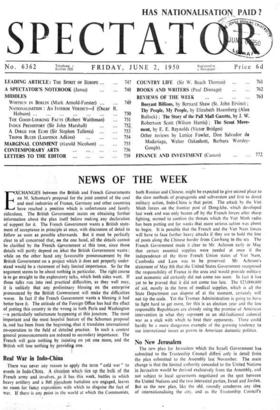Real War in Indo-China
There was never any reason to apply the term "cold war " to events in Indo-China. A situation which ties up the bulk of the French army and involves, 4s. it has this week, battles in which heavy artillery and a fun pasachute battalion are engaged, leaves no room for fancy expressions with which to disguise the fact of war. If there is any point in the world at which the Communists, both Russian and Chinese, might be expected to give second place to the slow methods of propaganda and subversion and first to direct military action, Indo-China is that point. The attack by the Viet Minh forces _on the frontier post of Dong-khe, which developed last week and was only beaten off by the French forces after sharp fighting, seemed to confirm the threats which the Viet Minh radio has been putting out for weeks that more serious action was about to begin. It is possible that the French and the Viet Nam forces will have to face further heavy attacks if they are to hold the line of posts along the Chinese border from Cao-bang to the sea. The French Government made it clear to Mr. Acheson early in May that certain essential supplies were needed at once if the independence- of the three French Union states of Viet Nam, Cambodia and Laos was to be preserved. Mr. Acheson's statement of May 8th that the United States Government recognised the responsibility of France in the area and would provide military and economic aid certainly did not come too soon. In fact it has yet to be proved that it did not come too late. The $23,000.000 of aid, mostly in the form of medical supplies, which is all the State Department can dispose of at the moment, certainly will not tip the.scale. Yet the Truman Administration is going to have to fight hard to get more, for this is an election year and the less responsible Republicans are already using the promise of American intervention in what they represent as an old-fashioned colonial war as a stick with which to beat their opponents. There could hardly be a more dangerous example of the growing tendency to use international issues as pawns in American domestic politics.


































